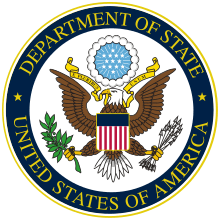Bureau of Oceans and International Environmental and Scientific Affairs
The Bureau of Oceans and International Environmental and Scientific Affairs (OES) is a functional bureau within the United States Department of State. The Assistant Secretary of State for Oceans and International Environmental and Scientific Affairs coordinates a suite of portfolios related to oceans, environmental, polar, scientific, fisheries, wildlife, conservation, and natural resource and health affairs that affect U.S. foreign policy interests.[1]
Overview
The Bureau is headed by the Assistant Secretary of State for Oceans and International Environmental and Scientific Affairs. Principal Deputy Assistant Secretary Jonathan Moore has lead the bureau since April 2020.[2]
The Oceans and Fisheries Directorate has two offices dedicated to international oceans issues. The Office of Marine Conservation focuses on international fisheries matters and related problems and the Office of Oceans and Polar Affairs has primary responsibility for international ocean law and policy, marine pollution, marine mammals, polar affairs, maritime boundaries, and marine science. Deputy Assistant Secretary Evan Bloom[3] has led the directorate since August 2019.
The Environment Directorate deals with environmental issues including environmental aspects of international trade and safeguarding hazardous materials requiring multilateral agreements within the Office of Environmental Quality and Transboundary Affairs. The Office of Conservation and Water develops U.S. foreign policy approaches to conserving and managing the world ecosystems and to transboundary water issues. John Thompson, acting Deputy Assistant Secretary, has led the directorate since October 2019.[4]
The Health, Space and Science Directorate includes the Office of International Health Affairs which works with U.S. Government agencies to facilitate policy-making regarding international bioterrorism, infectious disease, surveillance and response, environmental health, and health in post-conflict situations. The Office of Space and Advanced Technology handles issues arising from our exploration of space to assure global security regarding this new frontier, and the Office of Science & Technology (S&T) Cooperation promotes the interests of the U.S. science and technology communities in the international policy arena, negotiates framework and other S&T agreements, manages the Department's Embassy Science fellows program, and takes a leading role in representing U.S. science and technology in multilateral international organizations, such as UNESCO and other UN organizations, APEC, OECD and others. The Health, Space and Science Directorate has been led Dr. Jonathan Margolis, acting Deputy Assistant Secretary, since 2011.[5]
History
The Department of State Appropriations Authorization Act became law in October 1973,[6] which led to the establishment of the bureau in 1974.[7] The new bureau assumed responsibility for the negotiation of international environmental and natural resource agreements and treaties with other states. The bureau was created by consolidating the duties of several offices.[8]
- the Office of International Scientific and Technological Affairs;
- the Office of Special Assistant to the Secretary of Fisheries and Wildlife, and Coordinator of Ocean Affairs;
- the Office of the Special Assistant to the Secretary for Population Matters; and
- the Special Assistant to the Secretary for Environmental Affairs.
The bureau has been led by distinguished foreign service officers like Career Ambassador Thomas Pickering and AmbassadorJudy Garber, as well as public servants like Ambassador (retired) John Negroponte.
References
- https://fam.state.gov/FAM/01FAM/01FAM0540.html
- https://www.state.gov/biographies/jonathan-moore/
- https://www.state.gov/biographies/evan-bloom/
- https://www.state.gov/biographies/john-thompson/
- https://www.state.gov/biographies/jonathan-margolis/
- https://www.congress.gov/bill/93rd-congress/house-bill/7645
- http://www.allgov.com/departments/department-of-state/bureau-of-oceans-and-international-environmental-and-scientific-affairs?agencyid=7177
- http://www.allgov.com/departments/department-of-state/bureau-of-oceans-and-international-environmental-and-scientific-affairs?agencyid=7177
